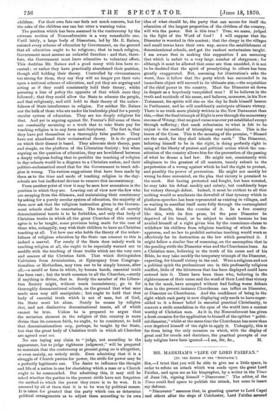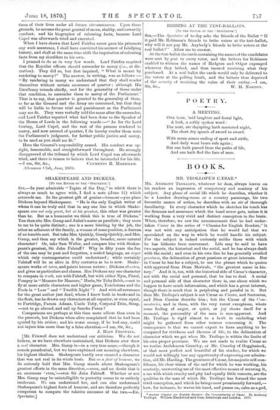MR. MARKHAM'S "LIFE OF LORD FAIRFAX."
[TO THE EDITOR OF THE " SPECTATOR:1
trust that you will be able to give me a little space, in order to refute an attack which was made upon the great Lord Fairfax, and upon me as his biographer, by a writer in the Times of June 7th, signing himself "Discoverer." The editor, of the Times could find space to publish the attack, but none to insert my defence.
" Discoverer " assumes that, in granting quarter to Lord Capel and others after the siege of Colchester, Lord Fairfax assured them of their lives under all future circumstances. Upon these grounds, he accuses the great general of mean, shabby, and cowardly conduct, and his biographer of colouring facts, because Lord Capel was afterwards tried and executed.
When I have shown that Lord Fairfax never gave his prisoners any such assurance, I shall have convicted his accuser of falsifying history, and shall at the same time shift the imputation of colouring facts from my shoulders to his own.
I proceed to do so in very few words. Lord Fairfax required that the Royalist officers should surrender to mercy (i.e., at dis- cretion). They did so, but first inquired, " What is meant by rendering to mercy?" The answer, in writing, was as follows :— " By rendering to mercy we understand that they shall render themselves without certain assurance of quarter ; although His Excellency intends chiefly, and for the generality of those under that condition, to surrender them to mercy of the Parliament." That is to say, that quarter is granted to the generality of them, so far as the General and the Army are concerned, but that they will be liable to future trial and punishment as the Parliament may see fit. They were verbally told the same after the surrender, and Lord Fairfax reported what had been done to the Speaker of the House of Lords in the following words:.—" As for the Lord Goring, Lord Capel, and the rest of the persons rendered to mercy, and now assured of quarter, I do hereby render them unto the Parliament's judgment, for farther public justice and mercy, to be used as you shall see fit."
Here the General's responsibility ceased. His conduct was up- right, honourable, and straightforward throughout. He strongly disapproved of the tribunal by which Lord Capel was afterwards tried, and there is reason to believe that he interceded for his life.































 Previous page
Previous page